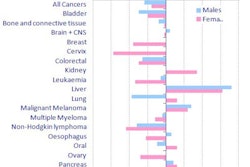Chemoradiation for patients with stage-four (T4) laryngeal cancer appears to be an effective and reasonable treatment option, according to a study in Head & Neck (November 3, 2011).
Patients with T4 laryngeal cancers, including those with large-volume lesions, are often excluded from organ preservation trials due to expectations of inferior survival and function outcomes, noted the study authors, from the University of Chicago and Duke University Medical Center.
To determine whether these patients actually have acceptable survival and function when treated with organ preservation strategies, the researchers conducted a retrospective analysis of prospectively collected data of a cohort of patients with T4 laryngeal cancer. They reviewed the cases of all T4 laryngeal cancer patients who were enrolled in the University of Chicago concomitant chemoradiotherapy protocols from 1994 to the present.
For this study, they chose 80 newly diagnosed T4 laryngeal cancer patients, 55 with large-volume tumors. After reviewing the patient records, the researchers found two- and five-year survival rates to be 60% and 48.7%, respectively. In addition, progression-free survival rates were 52.6% and 47.6%, respectively.
Chemoradiation for patients with T4 laryngeal cancer appears to be an effective and reasonable option, "particularly in light of the satisfactory survival and function-preservation rates," the researchers concluded.



















